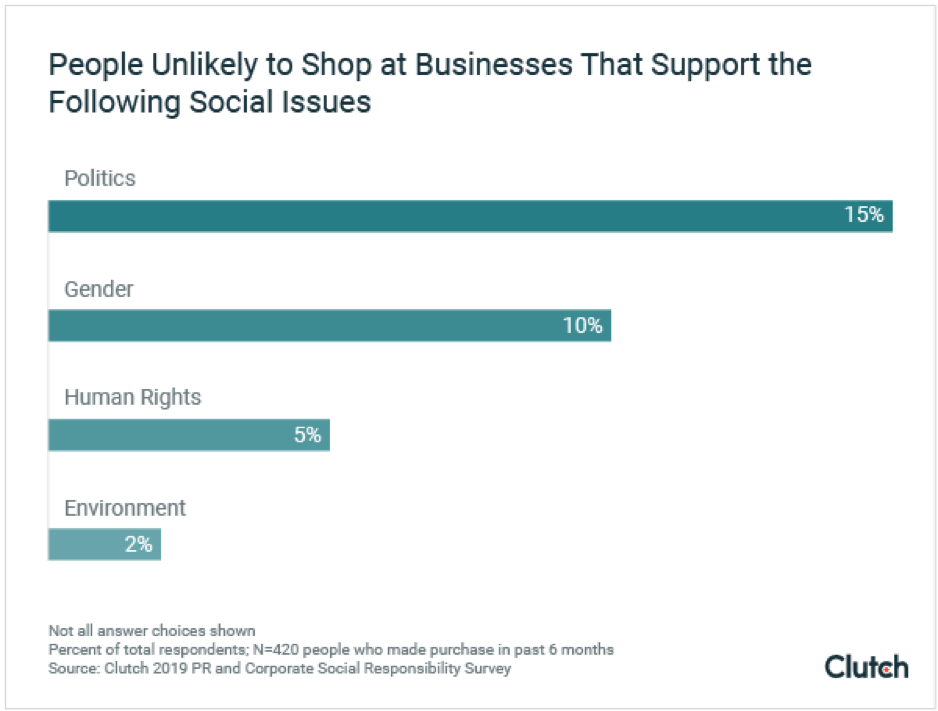People expect companies across many industries to commit to corporate social responsibility (CSR).
When asked which industries should commit to CSR, respondents answered:
- Food retailers (70%)
- Technology (70%)
- Fashion (65%)
- Health and beauty (64%)
- Restaurant (62%)
In this article, we will explore how CSR can strengthen your company’s online reputation.
We will also take a look at how one restaurant meets the challenge of combining CSR policies with supporting social charitable activities.
Use this article build a CSR strategy that meets customer expectations, builds trust with consumers, and influences buying decisions.
The Importance of Corporate Social Responsibility
At its core, corporate social responsibility (CSR) is a voluntary, self-regulating commitment to sustainable and ethical business practices.
CSR has evolved, though, and in 2019 it also implies a commitment to drive social and environmental change.
The majority of people expect businesses to voice their support for social issues through donations, social media, sponsorships, and events.
As governments fail to address urgent issues such as environmental decline, world hunger, and human rights, consumers increasingly expect businesses to fill the gaps.
According to the Clutch study, three-fourths of consumers believe that large and medium-sized businesses should support social movements. Over half (60%) believe that small companies should also support social movements.
Businesses can no longer afford to skip CSR policies and social cause activities.
What Causes Should Businesses Commit To?
Nearly 60% of consumers think small businesses should support social movements, according to a recent study by Clutch. Yet, more than half of people will likely avoid purchasing from a company that supports issues they disagree with.
As a small business, you may not be in a position to take significant risks by speaking out on social issues. Fortunately, there are ways to minimize the risks by choosing “safe” causes that pair well with your brand’s mission and CSR policies.
For example, reducing your company’s carbon footprint and learning new ways to produce, package, and present your products or services supports environmental causes without getting controversial.
Should you choose to support a higher-risk social cause, consider the per cent of customers you risk alienating.
Politics and gender are the highest-risk social causes.
Fifteen per cent of people (15%) say they’re unlikely to patronize a business that supports political issues, and ten per cent would avoid companies that support gender issues.
If you’re hesitant to commit to a social cause because of the risk, consider hiring one of the top public relations firms to guide your CSR activities.
How CSR Can Build Trust with Customers
Charitable giving and volunteer activities can strengthen your brand’s reputation if people perceive your brand as genuinely concerned about the issues you support.
Aligning your company policies and practices is essential to demonstrate a genuine commitment to CSR.
One brand that demonstrates a well-balanced CSR program of policies, practices, and social efforts is Panera Bread.
Panera’s CSR policies promise customers responsibly-raised, clean food with no artificial preservatives, sweeteners, flavours, or colours. The company also commits to food that’s “raised responsibly,” and sourced from local farms.
Additionally, the company:
- Packages unsold food and donate it to local charities
- Supports non-profit events by donating fresh bakery products
- Participates in a fundraising program
The combination of CSR company policies and similar charitable activities are an excellent example of how businesses can align efforts and policies to prove an authentic commitment.
How CSR Boosts Your Brand Image
When you create sustainable, ethical company policies that go above and beyond government regulations, you build trust with your customers.
Further, when your business supports a cause that resonates with customers, you create a human connection that influences people’s buying decisions.
CSR also provides a way to generate positive press surrounding your brand. According to Reputation Management, this helps build a buffer against the negative press, scandals, or mishaps that may happen in the future.
How to Promote Your CSR
To generate publicity surrounding your corporate social responsibility, your company must promote its activities across multiple platforms, including:
- Blog articles
- Social media campaigns
- Advertising
- Email marketing
- Press releases
Some businesses have in-house staff dedicated to promoting their CSR, and others hire online reputation agencies and experts to manage promotions for them.
Use CSR Build Your Online Reputation
A well-planned corporate social responsibility strategy can influence buying decisions, generate positive press for your brand, and protect your company against future scandals.
 Grayson Kemper is a senior content writer for Clutch, a ratings and reviews platform for B2B marketing and technology services. He specializes in online marketing and emerging technologies research.
Grayson Kemper is a senior content writer for Clutch, a ratings and reviews platform for B2B marketing and technology services. He specializes in online marketing and emerging technologies research.
Views of the author are personal and do not necessarily represent the website’s views.
Thank you for reading the column until the very end. We appreciate the time you have given us. In addition, your thoughts and inputs will genuinely make a difference to us. Please do drop in a line and help us do better.
Regards,
The CSR Journal Team



